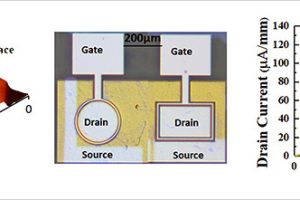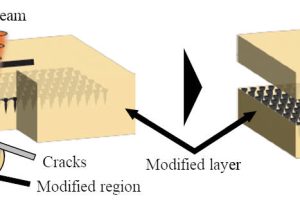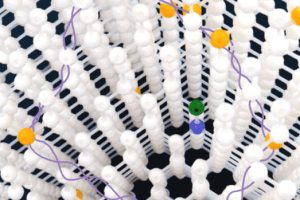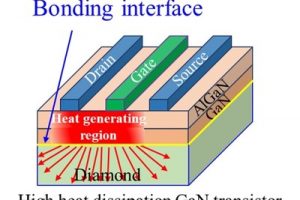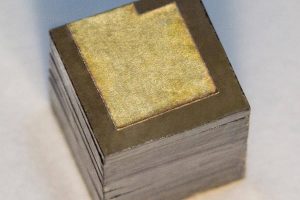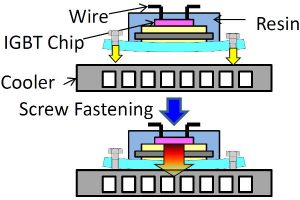P-channel diamond mosfets have been made many times because the carbon bulk can be doped with boron, or surface hydrogen can pull appropriate carriers into the channel. N-channel diamond mosfets have not proved so easy, blocking the route to diamond CMOS and all the high-voltage (bandgap = 5.5eV), high temperature and high thermal conductivity advantages that it might bring. Now ...
Tag Archives: diamond
16x GaN power boost with diamond heat extraction
DARPA has awarded Raytheon a $15m four-year contract to increase the power density of GaN power devices in military radar. “The improved transistors will have 16 times higher output power than traditional Gallium Nitride with no increase in operating temperature,” according to the company. “Thermal management is no longer a limiting factor,” added Raytheon president Colin Whelan. Key to this ...
Lasers cut diamond into more useful wafers
Chiba University has found a way to cut blocks of diamond into thin wafers along a difficult but desirable crystal plane using lasers. The ‘100’ plain leaves a surface that is relatively easy to planarise and etch for semiconductor use, according to the Chiba researchers, but diamond wants to crack along its 111 plane, so any crack-based separation starting in ...
Diamond qubits are fault-tolerant
Spin qubits in diamond can be made fault-tolerant, according to researchers from Fujitsu, Element Six and QuTech, who have designed and built one. Quantum bits are noisy, and techniques are needed to handle this noise of quantum computers are to be useful. One possibility is not to work with single qubits, but to do identical operations on bunches of linked ...
Diamond carries stuff up from 660km underground
My mind got boggled again yesterday – someone had found a mineral enclosed in a diamond that bought it up from the Earth’s lower mantle – amazing. I just looked it up – the mineral was our new friend a perovskite – in this case calcium silicate (CaSiO3) and not the Pb-halide type appearing in solar cells. Carried in that crystal structure ...
Add the speed of GaN to the thermal conductivity of diamond
Seeking a route to high-performance power semiconductors, scientists in Japan have bonded gallium niride to a diamond substrate – the latter an insulator whose thermal conductivity is many times that of copper or silver. “The researchers succeed in the direct bonding of diamond and GaN at room temperature, and demonstrate that the bond can withstand heat treatments of 1,000℃, making ...
Boron arsenide removes heat quicker, second only to diamond
US researchers have created a non-natural material that could improve heat extraction from semiconductors, and is the first of a previously-predicted class of high thermal conductivity materials. Update: This record was beaten after only a few days, and the theory revealed If it could be made to exist, boron arsenide with a cubic crystal structure was calculated to have a high ...
6mm nuclear battery lasts for 100 years
Diamond diodes are at the heart of a nuclear battery, designed by Russian researchers
PCIM: Heat spreader keeps shape despite thermal cycling
Aiming at IGBT modules, Japanese heat spreader maker ALMT has developed a thermal base plate alloy that improves heatsink contact. IGBT base plates are subtly convex (see diagram) so that when they are mounted on a flat base plate, the screw holes have a gap beneath them (~200μm). When the screws are tightened, the curve means that the centre of ...
Graphene and diamonds shun friction
No friction, is the result of US research into diamonds and graphene According to Argonne National Laboratory, diamond nanoparticles and small patches of graphene can be combined to produce superlubricity – where friction drops to near zero. According to scientist Ali Erdemir, as graphene patches and diamond particles rub up against a ‘diamond-like carbon’ surface, the graphene rolls itself around ...
 Electronics Weekly Electronics Design & Components Tech News
Electronics Weekly Electronics Design & Components Tech News
